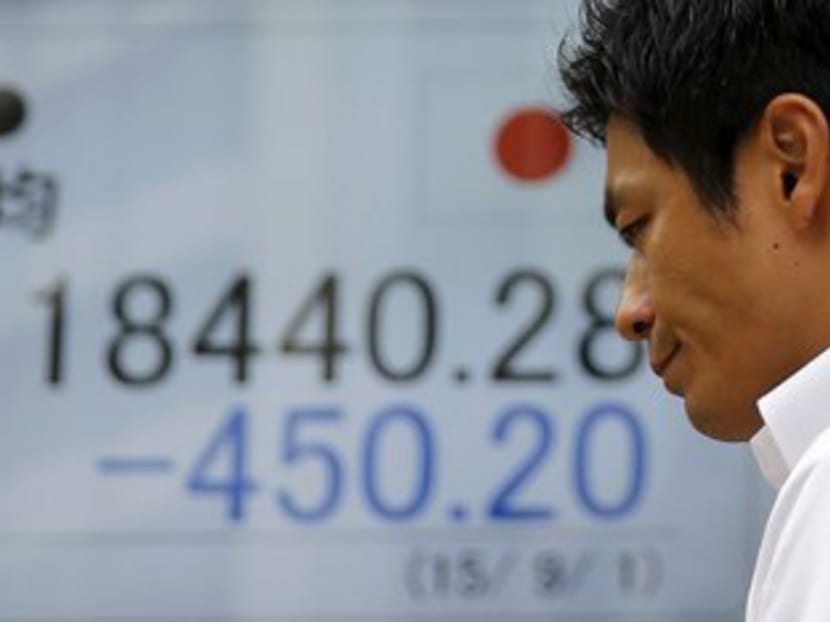Markets start September with a dive as China woes deepen
SINGAPORE — Global stock markets tumbled yesterday, extending last month’s brutal selloff as concerns about China were reignited by surveys that showed its giant manufacturing sector shrinking at its fastest pace in three years and its services sector also cooling, raising fears that the world’s second-largest economy is headed for a hard landing.

Japan’s Nikkei-225 index slid 3.8 per cent yesterday. Photo: Reuters
SINGAPORE — Global stock markets tumbled yesterday, extending last month’s brutal selloff as concerns about China were reignited by surveys that showed its giant manufacturing sector shrinking at its fastest pace in three years and its services sector also cooling, raising fears that the world’s second-largest economy is headed for a hard landing.
Hurt by weak demand, overcapacity and falling investment, the Chinese economy has also been buffeted by plunging shares and a shock yuan devaluation, in what some have called a perfect storm of factors that is rattling global markets and could strain relations with China’s major trading partners. Japanese Finance Minister Taro Aso said yesterday it would be beneficial for this week’s meeting of the Group of 20 major economies in Ankara to discuss frankly what is happening in China, Japan’s biggest trading partner.
The MSCI All-Country World Index was down about 0.9 per cent mid-afternoon in Europe, a day after losing 8.4 per cent in August in its worst month since 2012, Bloomberg data showed. The MSCI Asia-Pacific Index slid 2.2 per cent to extend its 8.5 per cent slump last month.
“The trend towards deceleration has become clear in China. This isn’t particularly surprising, but the market continues to be very sensitive to the direction in China,” said Mr Masaaki Yamaguchi, a Tokyo-based equity market strategist at Nomura Holdings.
Among the key Asian benchmarks, China’s Shanghai Composite Index lost 1.2 per cent yesterday, Japan’s Nikkei-225 Index slid 3.8 per cent and Hong Kong’s Hang Seng Index fell 2.2 per cent. Singapore’s Straits Times Index slipped 1.3 per cent to close at 2,882.77, deepening the previous month’s 8.8 per cent decline.
In Europe, London’s FTSE, Germany’s DAX and France’s CAC were down between 2 and 2.5 per cent in mid-afternoon trade, while futures on the Dow Jones Industrial Average pointed to a 2 per cent drop in the cash market at the New York opening.
In the oil markets, Brent and New York crude were down 2.1 per cent and 1.8 per cent to US$53.01 (S$74.73) and US$48.34 a barrel, respectively.
China’s official manufacturing Purchasing Managers’ Index (PMI) fell to 49.7 in August from 50 in July, the National Bureau of Statistics said yesterday, the lowest since August 2012, and below the 50-point mark separating growth from contraction. New orders — a proxy for domestic and foreign demand — fell to 49.7 in August from July’s 49.9, while new export orders contracted for an 11th straight month. A private survey by Caixin/Markit focusing on smaller factories pointed to an even sharper contraction down, with the PMI dropping to 47.3, the worst reading since March 2009. Both surveys also showed manufacturers were laying off workers at a faster rate as their order books shrank.
Analysts said the weak PMI readings were partly due to the explosions in Tianjin last month and the closure of some factories in northern China to clear Beijing’s skies for a huge military parade tomorrow.
However, China’s services companies are also showing clear signs of fatigue, to the point where growth in that sector may no longer be enough to offset factory weakness. The official services PMI reading cooled slightly to 53.4, while remaining well in expansion territory, but the private survey PMI fell sharply to 51.5, its lowest level since July last year. That dragged a composite PMI combining factory and services readings to below 50 for the first time since April last year.
Analysts said the bleak readings affirmed bets that China, which has slashed interest rates five times since November, must loosen policy again soon to avert a sharper economic downturn that could weigh on global growth, even as the US Federal Reserve prepares to raise interest rates. The last time China slashed interest rates was on Aug 25, when it also lowered the amount of reserves banks must hold for the second time in two months.
“We believe further aggressive monetary easing and proactive fiscal policy, along with financial liberalisation, are needed to maintain growth at around 7 per cent,” ANZ economists said. AGENCIES





